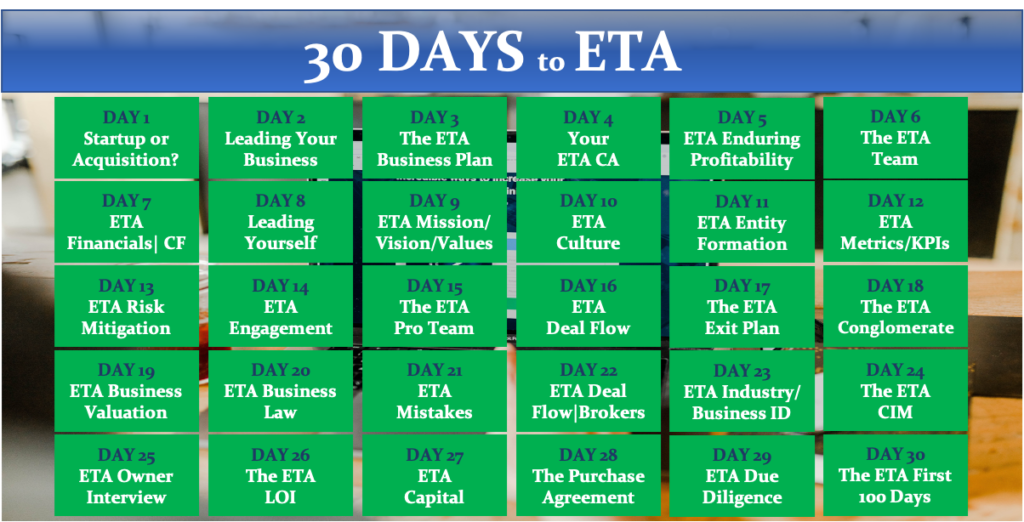In my most recent post in this 30 Days to ETA series, The ETA Business Plan, I shared that you can go anywhere you want with your business, but you’ll get there faster if you establish a Business Plan. The adage “A goal without a plan is just a dream” has never been more true (You can read the post by CLICKING HERE). Part of that plan, and foundational to the process, is identifying your ETA Competitive Advantage. Thinking strategically about the value your business brings to the market and the benefits it provides should be advantages you look to capitalize on. And your ETA Competitive Advantage should be identified/contingency planned while looking at businesses to acquire!
Attend Webinar Workshop: 30 Days to ETA
What is Competitive Advantage?
Regardless of business type that you explore purchasing, there are probably thousands (if not hundreds of thousands) of similar businesses already in existence and potentially starting. So what will make a customer choose the business you’re considering purchasing over another? Why would someone travel further, pay more, or overlook small personal inconveniences to get your product or service? What makes you so special? What sets you apart from your competition? These questions drive to the heart of your ETA Competitive Advantage.
In simple terms, this advantage is what makes your business better than its competition in the minds of your customers.
What Does Your ETA Competitive Advantage Look/Feel Like?
To be successful as an Acquisition Entrepreneur, you need to be able to articulate the benefit you provide to your target market that’s better than any of the competition. You must have something or do something unique to draw customers to you right now and to entice buyers in the end. This does not mean blending in with the thousands of other competitors that are out there.
So as intuitive as this sounds, why do so many struggle with the concept? Your ETA Competitive Advantage doesn’t just sell your product or service — It multiplies the value of your business.
You can compete on cost as a business owner, but you’ll lose every time!
Sam Palazzolo, Managing Director @ Tip of the Spear Ventures LLC
Six ETA Competitive Advantage Examples
I’m not going to lie… Identifying a business competitive advantage is not that difficult. What is difficult is executing on that identified competitive advantage! I’ve seen hundreds of business leaders that perceive an advantage exists in their mind, only to have said advantage be nowhere to be seen. So, with that your ETA Competitive Advantages in mind I compiled the following list of six ETA Competitive Advantage examples:
1. People
This advantage isn’t about the number of owners, managers, or employees your company has. It’s not about your company’s gender, age, or ethnic ratios. This competitive advantage is about the loyalty of your team. One of the strongest competitive advantages a business can have is a remarkable team. If you invest in your team and include them in your vision, they will buy into your goal. They will want everyone they know to experience your product. If you get buy-in from your team, you have a rare, valuable commodity.
2. Organizational Culture
According to the Society for Human Resource Management (SHRM), Organizational Culture can be defined as follows:
“The proper way to behave within the organization. This culture consists of shared beliefs and values established by leaders and then communicated and reinforced through various methods, ultimately shaping employee perceptions, behaviors and understanding. Organizational culture sets the context for everything an enterprise does. Because industries and situations vary significantly, there is not a one-size-fits-all culture template that meets the needs of all organizations.”
Society for Human Resource Management (SHRM)
A company’s people show customers how to use your products or services. A successful owner will identify his individual employees’ strengths and teach his entire team to model those attitudes and behaviors. The company will streamline common expectations for its team if it excels in organizational culture. Companies that create value through organizational culture do so through many months and sometimes years of intentional training. They recognize employees’ unique knowledge, skills, and abilities. Then they teach each to work in a similar way for a common goal. Together, they accomplish something greater than one alone can achieve.
3. Processes and Practices
While many companies can make or sell related products or provide comparable services, companies can set themselves above their competition by creating unique manufacturing methods or service processes. Processes and practices in regards to your ETA Competitive Advantages are not only the what’s and where’s, but the how’s regarding execution.
4. Products and Intellectual Property
Your products or services are new and innovative in design or technology. They are unique, meaning you must protect your rights to that intellectual property through patents, copyrights, or trademarks. Without legal protection, competitors can replicate your product and take away your competitive edge.
If your business has a product, a system, or a design that isn’t easy for your competitors to replicate, you’ll want to direct your focus on these areas to protect yourself. If you can show your product’s unique design or your service’s unique process, you’ll add value to your product/service via intellectual property. Important to keep in mind that when your product’s value increases, so does the valuation of your business.
5. Capital and Natural Resources
Maybe you don’t have unique people, processes, products, or services. But you do have money. Cash capital is important in running your business, as poor cash flow management is the number one reason most small businesses fail (operationally, of course). Social capital can be achieved by creating a good name for yourself. Think of this as your business reputation. Your reputation is capital your competitors can’t purchase or achieve overnight, and makes your business more valuable as a result.
Obviously there are natural resources that may exist if the business you are exploring buying has land. Competitive advantages like oil, natural gas, ore, or coal are natural resources that add value.
6. Technology
The last advantage we’ll discuss combines intellectual property and capital in the form of Technology. Technology evolved into a powerful business asset during the Industrial Revolution at the turn of the 20th Century. Today, Technology is ever-evolving and plays an ever-increasing role in competitive advantage. If you are searching for a business in the tech space (software or hardware), or even if you’re not new technology or technological systems that none of your competitors can easily replicate can provide you with a valuable competitive advantage.
SUMMARY
Your ETA Competitive Advantage is an important aspect to consider when acquiring a business. How will you differentiate yourself from your competitors, those present today and those soon to arrive in the market. We discussed six ETA Competitive Advantages that you can look to employ, or screen for when searching for a company to acquire. It is precisely these competitive advantages that will increase the value of your business. The concept is simple – the harder it is for your customers to leave or the harder it is for your competitors to duplicate what you do, the more valuable your business is to buyers.
Sam Palazzolo




